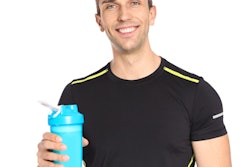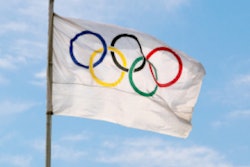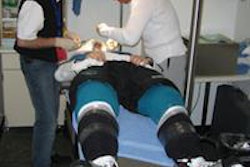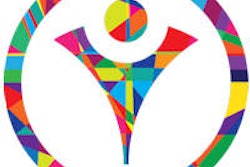
DrBicuspid.com is pleased to present the next installment of Leaders in Dentistry, a series of interviews with researchers, practitioners, and opinion leaders who are influencing the practice of dentistry.
With the 2012 Summer Olympics kicking off July 27, we spoke with British dentist Tony Clough, BDS, who was instrumental in setting up the dental care program for the games. Dr. Clough talked with us about the facilities available at the dental clinic, the particular challenges of providing care at such an event, and the importance of oral health for athletes.
Dr. Clough gained his degree in 1978 at the Royal London Hospital Dental School, University of London and was awarded his license in 1978 by the Royal College of Surgeons of London. He has been practicing in Chelmsford, Essex, since 1982.
DrBicuspid.com: What was your role at the 2008 Olympics in Beijing, and what role will you be playing this year?
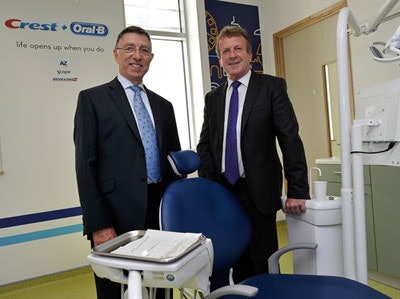 Tony Clough, BDS (right), and Paul Warren, DDS, from P&G Global Oral Care. All images courtesy of Crest and Oral-B.
Tony Clough, BDS (right), and Paul Warren, DDS, from P&G Global Oral Care. All images courtesy of Crest and Oral-B.
Dr. Clough: In Beijing, I was a dental advisor working for the International Olympic Committee (IOC). My role involved coordinating dental care with the Chinese dentists and reporting back routinely to the IOC Medical Commission.
In London, I set up the whole dental program over the last four years, sourced all equipment and materials, selected staff, set up treatment protocols, put together the pharmacy list, and worked with Crest and Oral-B (Procter & Gamble) to design the decor of the clinic.
This year I represent the IOC as an advisor with specific responsibility for contact sports, where there is a high incidence of orofacial injury. We have dentists at basketball, boxing, tae kwan do, water polo, judo, handball, and field hockey events. I will also help coordinate with Crest and Oral-B the surveys taking place in the clinic.
What dental facilities will be available to the athletes at the Olympic Games, and who will be eligible to receive this care?
The dental clinic is located on the fourth floor of the large polyclinic within the Olympic Village. We have eight surgeries, a dental lab, an x-ray room, an office, a decontamination suite, and a reception facility. Any athlete can attend the clinic, as can backup staff, trainers, managers, and all IOC family and officials.
We will attend to all urgent care, including toothaches, fractured teeth, and infections. We will also provide nonurgent care for those individuals who cannot easily access dentistry at home due to lack of time, money, or availability. There is also an extensive mouthguard program and a dental screening program to investigate and quantify the oral health of athletes.
“We expect 800 urgent care cases … [and] 150 to 200 root canal therapies.”
— Tony Clough, BDS
How long have you been involved in sports dentistry, and how did you develop an interest in it?
I have been involved in sports dentistry for 20 years, through my son's involvement in hockey. I started with premier division hockey teams, then moved onto teaching and coordinating the Sports Dentistry Diploma course at Eastman Dental Institute. I now take care of the British boxing and rowing teams.
For the IOC, I have presented workshops at their sports congress on health and injury in sport. I also wrote the dental section of their consensus statement on periodic health checks on athletes.
How many patients do you expect to see during the Olympics, and what conditions/emergencies do you most likely expect to treat?
We expect 800 urgent care cases, 1,000 routine follow-up cases, and several hundred screening patients. Many athletes arrive with wisdom teeth infections due to fatigue, flying, and stress. It is anticipated that we'll perform 150 to 200 root canal therapies.
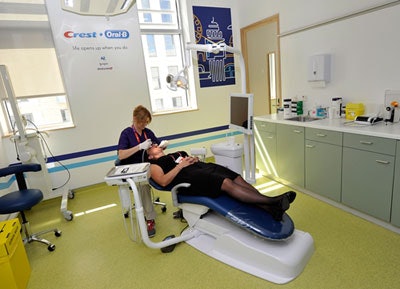 The London 2012 dental clinic.
The London 2012 dental clinic.
What are some common causes of dental problems in athletes?
The most common problems are wisdom tooth infections, general perio issues, and caries.
What are some particular challenges associated with providing dental care to athletes during an event like the Olympics?
The special challenges are having to plan treatment around an athlete's competition program/schedule. We cannot extract a tooth just before a competition, so maybe we will have to extirpate and extract it later. What anti-inflammatories and antibiotics should be given, and what pain killers to avoid drowsiness. Also, what treatments should we start if the athlete is about to go home where there is little dental care. Perhaps we may extract teeth rather than start a root canal therapy that could later become infected. It is a fine balancing act that needs to be carefully thought out.
Has anything surprised you about the oral health of these world-class athletes?
The amount of caries in developed countries and the lack of dental care some athletes have had in their countries are surprising. Money, time, and lack of available care seem to be the root of the problem.
How important is oral health for an athlete?
An athlete cannot perform to his or her best with poor oral health. Wisdom teeth infections and toothaches cause systemic problems, which affect performance and cause an inability to concentrate, train, or sleep. Generalized chronic periodontitis causes a low-grade pyrexia that will affect performance. Oral health is just as important as the health of any other part of the body, and it is our responsibility to educate athletes, coaches, and, most of all, team physicians about the importance of good oral health.




